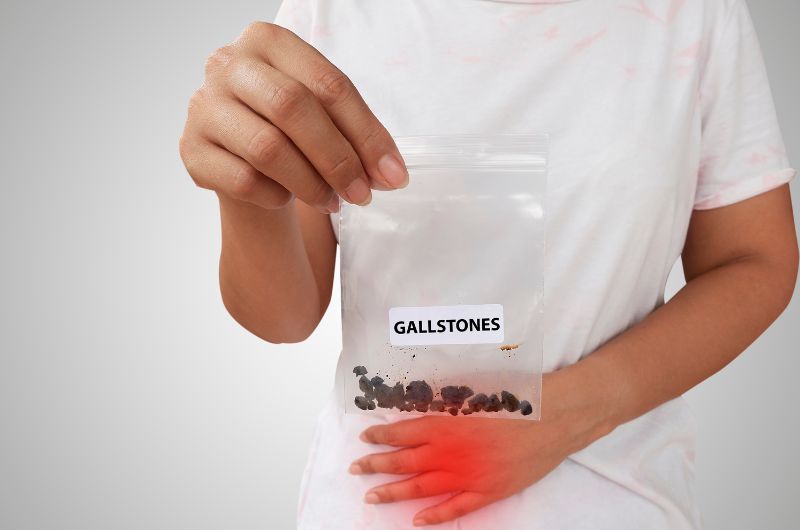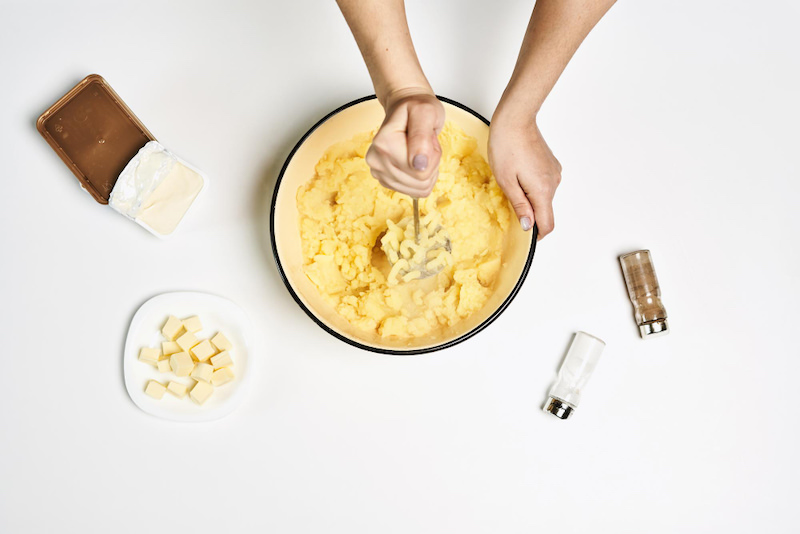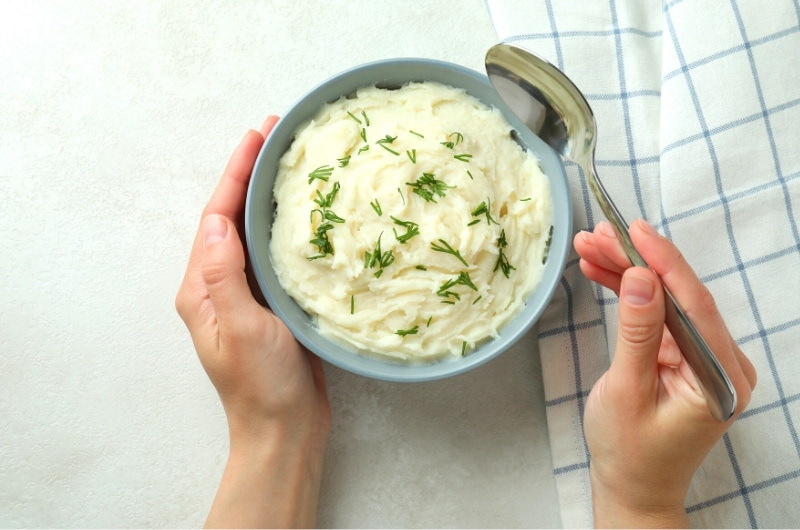Gallstone disease affects 10% of the adult population in the United States. If you have gallstones, you don’t need to avoid potatoes. If mashed potatoes are one of your favorite dishes, eat them in moderation. Avoid chips and french fries as they are high in saturated fats. Potatoes are healthy and safe to eat when cooked in a specific way to suit your diet. The factors that make you more susceptible to gallstones are obesity, diabetes, high-fat diets, smoking, rapid weight loss, and pregnancy.
Gallstones are cholesterol crystals that are formed and carried in the bile. Studies have shown that some nutrients are vital in developing gallstones or cholelithiasis.
Gallstone disease is one of the most common conditions that require surgical treatment. A person is more prone to developing it with increasing age.
Among the 40 -70-year-old age group, this disease seems more prevalent in females, with a female-to-male ratio 4:1.
What is gallstone disease?
The function of your gallbladder
The gallbladder is a part of your digestive system that collects and stores bile. Bile consists of bile salts, cholesterol, and other substances that help digestion by breaking down fats.
The gallbladder releases bile into the small intestine when food enters the stomach.
The bile ducts can sometimes become blocked by gallstones. It is the duct that connects the stomach to the intestine.
This blockage can cause pain, nausea, vomiting, and bloating. The stone may also cause reduced or obstructed bile flow to the intestine.
The gallbladder is vital to aid proper digestion but is not necessary to the human body. Therefore sometimes, it is suggested to get it removed surgically if it causes your symptoms to worsen.
Causes of gallstones
When there is an imbalance of salts and other chemical substances in the bile, it causes gallstone formation inside the gallbladder.

Although it’s not clear what causes the imbalance in the first place, doctors think that it is due to:
- Excessive cholesterol in your bile
- Too much bilirubin in your bile
- Incorrect emptying of the gallbladder
What can I eat with gallstones?
Most people having gallstones are advised for surgery by doctors. Leading to the surgery, you must eat as healthy as possible and lose weight if you are overweight.
While losing weight, it is crucial to do so gradually and steadily. 1-2 lbs. or (0.5- 1 kg) per week is considered a safe weight loss range.
A low-fat and healthy balanced diet will help you reduce the symptoms associated with gallstone disease.
Avoid any foods that trigger the onset of pain till you have the surgery and get your gallbladder removed.
There is no specific diet to treat symptoms of gallstones or to prevent it on the whole. But if you eat a low-fat and high-fiber diet, it will help alleviate symptoms tremendously.
A healthy balanced diet should consist of:
- Fruits and vegetables: 3-5 portions a day.
- Starchy carbohydrates: Wholegrain or high-fiber bread, chapatis, rice, pasta, and potatoes.
- Dairy products: Milk, yogurt, and cottage cheese of the low-fat variety.
- Meat, fish, and eggs: Stick to lean white meat and no more than 2 egg yolks daily.
- Beans, pulses, and soy protein as an alternative to meat.
- Unsaturated fats: Such as olive oil, sunflower oil, and canola oil.
- High fiber: Fruits and vegetables, beans, pulses, pasta, rice, oats, and potatoes.
- Water: At least 2 liters of plain water or herbal teas daily.
Limit sugars, processed foods, high-fat foods, butter, ghee, meat, cheese, biscuits, and pastries.
Some practical tips to follow while cooking
- Measure your oil while cooking: no more than one teaspoon per person.
- While cooking meat, use water to deglaze the pan instead of adding more oil.
- Remove the skin and fat from meat, and choose leaner cuts.
- Bulk your meals with vegetables, legumes, and pulses instead of adding more meat.
- Use spray oil for cooking and wipe off excess oil.
- Avoid frying food. Bake, steam, boil, grill, or roast instead.
- Make your salad dressings using yogurt, lemon, and herbs instead of store-bought ones.
- Skim excess fat from the top of casseroles and broths.
- Avoid take-outs and prepackaged foods, and try to cook your meals as much as you can.
- While grocery shopping, buy food that contains less than 17.5 grams of fat per 100 grams. Anything more than that is high in fat and should be avoided.
Why taters are a healthy option for Gallstone disease
Research has shown that not all starchy foods are unhealthy.

Especially potatoes, since they’re a rich source of carbohydrates. In addition, it is a fat-free source of vitamin C, fiber, and potassium.
- The resistant starch present in potatoes helps you burn fat. It is satiating and acts as an economical energy source compared to other green leafy vegetables of the same portion size.
- Even though they have a glycemic index, they are low-energy-density food. That means even if you eat a lot of potatoes, you consume fewer calories.
- Despite their high GI value, potatoes are a healthy food providing fat-free sources of carbohydrates along with a significant amount of vitamin C, potassium, and fiber.
- One medium-sized potato provides you with only 110 calories. It has 4.5 grams of protein, 870 milligrams of potassium, 5 grams of fiber, 2 grams of iron, and 15 milligrams of sodium.
- Avoid fried potatoes, chips, and french fries as they have saturated fats and high amounts of carbohydrates and may worsen your symptoms.
- As long as you eat potatoes by boiling, baking, roasting, grilling, and mashing them. Also, when you don’t add too much oil, butter, or fat to it, it should not be a problem.
How can you prevent gallstones?
Yes, you can prevent gallstones. Studies have shown that regular exercise and a healthy diet, along with the following, can reduce your risk of developing gallstones.
- A study in the United States, conducted over 10 years, showed that more than 13,000 adults with higher vitamin C levels in their blood had a lower chance of gallstone formation.
- Another research has also shown a reduced risk of gallstone disease with moderate to high coffee consumption. It involved more than 200,000 people who drank 2-6 cups of coffee daily and had a reduced risk of gallstone disease.
- A high-fiber diet is also associated with lowered risk of gallstone disease.
- Drinking less alcohol may also prevent gallstones. You must not consume more than 14 units (equal to 6 pints of beer and 10 glasses of wine) of alcohol a week, as it can be detrimental to your liver and overall health.
- Don’t lose weight rapidly and starve yourself, and don’t eat below 1000 calories, as it can exacerbate your symptoms.
- Skipping meals can also increase the risk of gallstones.
Gallstone treatment options
Your doctor will determine your treatment depending on your symptoms and diagnostic testing reports. Treatment options include.
Surgery
Cholecystectomy is the surgical removal of the gallbladder. It is performed by inserting a tiny camera and special surgical tools inside your abdomen to remove the gallbladder.
Doctors also call this laparoscopic cholecystectomy. Your stomach may feel a bit uncomfortable and larger post-surgery from the gas used during surgery (among other things).
Medications
Certain oral medications prescribed by your doctor can help dissolve gallstones. This option is for people who cannot undergo surgery.
FAQs
What foods are bad for gallbladder attacks?
The foods to be avoided at all costs during a gallbladder flare-up are highly processed, high-fat dairy, butter, processed meats, sodas, fatty fish, avocados, and refined flour products.
Can you eat potatoes with gallstones?
Yes, you can. It is beneficial to your health when eaten in moderation.
You can bake, boil, steam, roast, and grill them. Avoid frying potatoes and having chips and French fries.
Can I eat spicy food if I have gallstones?
Spicy food isn’t directly a cause of gallstone formation.
It’s worth knowing, however, that some people with gallstones may find that spicy foods are a trigger, or worsen their gallstone symptoms.
Try to monitor your body’s response and avoid certain foods that seem to cause discomfort.
Do I need to permanently change my diet after gallbladder removal surgery?
After gallbladder removal (cholecystectomy), your body might have a harder time digesting fats.
Many people have to make dietary changes post-surgery, like eating smaller portions, more frequent meals, and reducing fat intake.
Everyone is different, and not all patients will need to permanently change their diets. It’s important to discuss this with your doctor or a dietitian.
Does cooking method affect the nutritional value of foods for gallstones patients?
Yes, the cooking method can affect the nutritional value of foods.
For example, boiling or steaming vegetables helps preserve their fiber content, which is beneficial for those with gallstones.
On the other hand, frying or deep-frying foods can add a significant amount of fat, which could be problematic.
Takeaways
There is no specific diet for gallstone disease. You have to be mindful of what you consume when you have it.
The information mentioned earlier can help you during gallstone attacks and before and after gallbladder removal surgery. In addition, there are limited treatment options for gallbladder disease.
By practicing healthy lifestyle habits and maintaining a gallbladder-friendly diet, we can better manage gallstone symptoms and potentially reduce the need for surgical intervention.
While this article is intended to provide you with helpful information, it’s not a substitute for professional medical advice. Please consult a healthcare professional before making any major dietary changes, especially if you have an underlying condition like gallstones.
References
- https://pubmed.ncbi.nlm.nih.gov/16022643/
- https://my.clevelandclinic.org/health/treatments/4916-nutrition-therapy-for-gallbladder-disease
- https://pubmed.ncbi.nlm.nih.gov/32991309/
- https://www.health.harvard.edu/blog/5-cooking-methods-that-are-making-your-food-unhealthy-2020022718912
- https://pubmed.ncbi.nlm.nih.gov/26198295/
- https://www.aafp.org/afp/2005/1015/p1585.html


